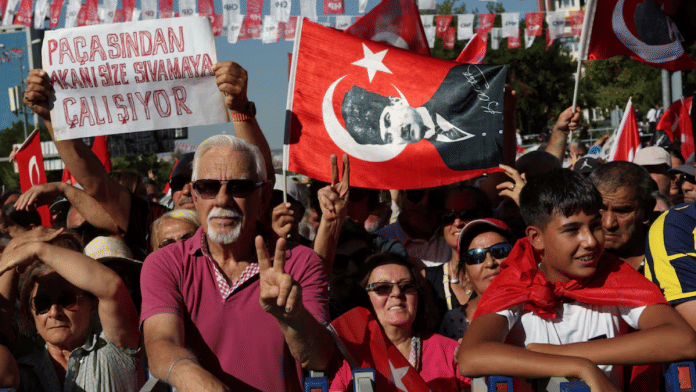Ankara: A Turkish court delayed a decision on Monday whether to oust the main opposition leader and annul his party’s 2023 congress over alleged irregularities, in a case that has already deepened the country’s political crisis.
The judge in Ankara adjourned the case concerning the Republican People’s Party (CHP) and its chairman, Ozgur Ozel, until October 24.
Hundreds of CHP members, including President Tayyip Erdogan’s main political rival, Istanbul Mayor Ekrem Imamoglu, have been jailed pending trial in a separate, sprawling legal probe into alleged graft and terrorism links.
If the court rules next month to annul the CHP’s congress, that would strip Ozel – the party’s combative, hoarse-voiced chair who has risen to prominence since Imamoglu’s arrest – of the title that he won there.
The case is seen as a test of Turkey’s shaky balance between democracy and autocracy. It threatens to deepen disarray and infighting in the opposition camp, boosting Erdogan’s chances of extending his 22-year rule.
The court rejected plaintiff requests to suspend Ozel, 50, and his administration pending a verdict, and it ordered the CHP and election boards to submit information on planned CHP general and Istanbul congresses next week, once they are done.
The centrist CHP denies the charges against it and is level with Erdogan’s Islamist-rooted, conservative AK Party (AKP) in opinion polls.
Anti-Erdogan street protests flared in recent days ahead of Monday’s court ruling, and the case has badly rattled Turkish assets. The lira, stocks and bonds strengthened after Monday’s adjournment decision.
The opposition, human rights groups and some European leaders say the crackdown on the CHP is politically motivated and anti-democratic, charges rejected by the government, which says that Turkey’s judiciary is independent.
“This is a serious moment that signals a regime change in Turkey from a competitive authoritarianism, in which opposition parties could still win elections, to a kind of hegemonic authoritarianism, in which they are more symbolic and unable to win,” said Seren Selvin Korkmaz, co-founder and co-director of IstanPol Institute, an Istanbul-based think tank.
The legal crackdown on CHP, which began in October last year, has sharpened concerns over what critics call Turkey’s slide towards autocracy, as the courts, the army, media, the central bank and other formerly more independent institutions have bent to Erdogan’s will during his 22-year reign.
Government officials and some analysts say last year’s local elections – in which the CHP swept most major cities in the biggest ever defeat for Erdogan’s AKP – showed that NATO member Turkey remains a vibrant democracy, despite critics’ concerns.






